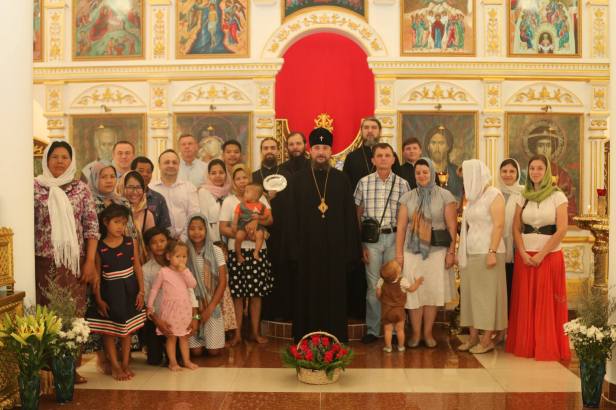Oftentimes, the forced conversion of Uniates in Chelm, Poland is cited as evidence that the Orthodox “crusaded” just as the Roman Catholics did. This is untenable, however.
For one, there was no parallel jurisdiction set up. The Uniate bishop, Mikhail Kuzemsky, had resigned due to bad health and the see was vacant. And so, the Russians appointed Markell Popel to administer the diocese, himself a Uniate and not a Bishop. One source notes, “It is difficult to determine whether from the beginning he intended to lead the diocese out of communion with Rome and into the Russian-Orthodox Church, or whether this step was eventually forced upon him.”
Nevertheless, Popel pressed on with both Byzantine liturgical reforms and bringing in another Uniate, Archbishop Iosif Sokolovsky, a Bulgarian Uniate, to perform ordinations in the eparchy.
Perhaps not such a great administrator, Popel was inflexible. There were local uprisings over liturgical “reforms” whose purpose was to remove Roman influences. Initially 100 Latinized clergymen left, looking for somewhere they would be free to practice the Latin rite. Ultimately, about 2/3rds of the local priests were replaced with Ukrainian (I believe Galician) Unitate priests–only 1/3 of the local priests remained.
Popel had to bring in more priests in order to replace those who had left, which led to local uprisings among those used to Latinized worship. Popel asked for assistance from local police in order to quell local uprisings, which turned violent.
So, while this is a horrendous state of affairs, there was no parallel church set up. These were all Uniates.
Why did locals resist the Uniates? Those who resisted did not do so because of their love for their former Latin-rite sympathetic Bishop. Rather, they did not want their distinct Polish traditions meddled with by foreigners (Galicians).
How did Chelm become Orthodox? Pope Pius IX, encouraged by Polish ideologues (who I suppose did not like Ukrainian influence), anathematized (and I presume excommunicated) Popel for installing Russian Orthodox priests–something that apparently never occurred. In response, about a year later Popel and all his clergy entered communion with the Russian Orthodox Church. Popel himself was ordained their Bishop. Sokolovsky asked to leave the diocese, but the Russian government for some reason did not grant permission (probably so that he would remain bishop of any Latin-rite churches, a Russification move of sorts being that he was a Uniate and not Latin-rite.) So Roman Catholics remained in the eparchy, but they were generally western oriented with a eastern Bishop. It is not clear if Roman Catholic lower clergy were allowed to remain.
Nevertheless, one third of Chelm (their Polish population, the Ruthenians, Belarussians, and Ukrainians remained Orthodox) re-converted to Roman Catholicism when circumstances allowed (I presume the allowance of a Latin-rite Bishop and Latinized clergy–something not allowed when the local population was under the direction of Popel). This shows that the policy pursued is far from a forced mass conversion of a population foreign to Orthodoxy, but in fact a peaceful transition of a majority Orthodox population to canonical Orthodoxy from Uniatism. Most of the resistance was among Roman Catholic priests who were selected by Mikhail Kuzemsky due to their Latin-rite sympathies as part of a purposeful policy in Poland to westernize Polish Uniates. Such priests were over-represented and therefore were replaced under Ukrainian (non-Polish sympathizing) Uniate administration.
Nevertheless, 1/3rd of the population was legitimately Latin Rite and western in their orientization (i.e. the Poles). So, their being dragged into the “liturgical reforms” did in fact constitute a persecution. However, this aberration and heavy handed policy is a far cry from a protracted crusading and policy of persecution employed by western powers to convert Orthodox and replace their Bishops. Furthermore, it is apparent that the persecution stage began as an issue between Uniates, not a Russian Orthodox policy of forcing conversions to Orthodoxy.
It should be noted that Father Serge Keheler, himself a Uniate, asserted that Uniatism was suppressed in Chelm by the local Roman Catholic clergy who were trying to rid the nation of the rite, not by the Russian Orthodox. (See p. 367 of his study here, particularly the last paragraph.) So, I conclude, Chelm Eparchy cannot be listed as an example of Orthodox persecution of Roman Catholics. More accurately, it is an example of Latinized Polish Roman Catholics persecuting local Belarussians, Ukrainians, and etcetera–until one day an eastern Uniate partisan took power. When this occurred, and the Polish party encouraged the Pope to break ties with him, he was forced to take himself and his congregations into Canonical Orthodoxy.

Help Grow the Orthodox Church in Cambodia!
Has this article blessed you? Please bless the Moscow Patriarchate’s missionary efforts in Cambodia to bring the Gospel to a people who have not heard it!
$1.00

